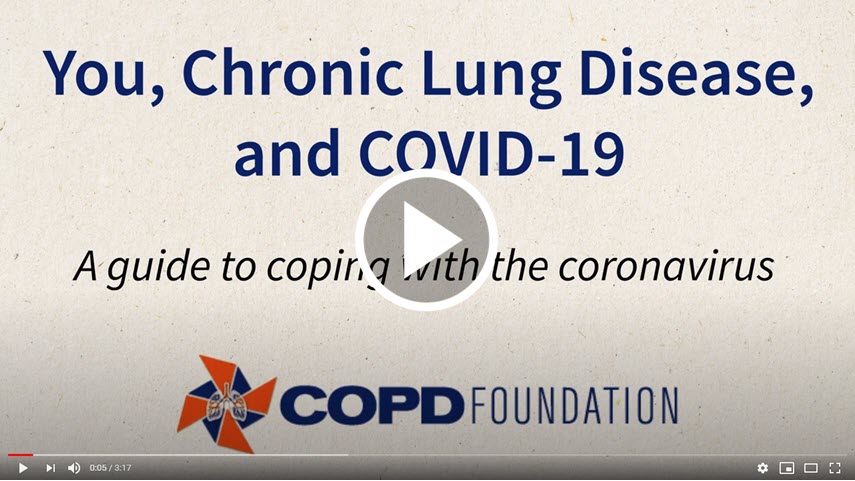Coronavirus Information for the COPD Community
The COPD Foundation is carefully monitoring the outbreak of coronavirus disease 2019 (abbreviated as "COVID-19"). We are working with our Medical and Scientific Experts to ensure that accurate information is shared with our community.
Our Latest COVID-19 Q&A
Our community has asked questions about COVID variants, vaccine boosters, and the continued need to wear masks.

A short video guide to coping with the coronavirus pandemic from the COPD Foundation. Informed by COVID-19 community surveys, and COPD360social. Funded by a generous grant from a member of the COPD Foundation Board of Directors.
The global situation changes daily and the World Health Organization updates their recommendations regularly https://www.who.int/emergencies/diseases/novel-coronavirus-2019/advice-for-public. We also encourage you to regularly visit the CDC website and check in with your state health department's website for local information. We are providing regular updates and answers to your questions in this blog post.
During this time of social distancing many patients have minimal access to pulmonary rehabilitation. The COPD Foundation partnered with the American Thoracic Society and the American Lung Association and published a patient information sheet in the April issue of the American Journal of Respiratory and Critical Care Medicine (AJRCCM).
The COPD Foundation, in partnership with the American College of Chest Physicians, American Lung Association, and American Thoracic Society released the following statement in response to the Centers for Disease Control and Prevention (CDC) recommendation for facial coverings to be worn in public settings during the coronavirus disease (COVID-19) pandemic. For more information review the facial covering statement.
Educational information "Face Coverings in a Pandemic" published in August 2020 by the American Thoracic Society can be found here. There are some questions about whether face masks/coverings are safe or could cause breathing problems or issues for people with COPD. Our continued message is that face masks/coverings are important and should be used. For more information, we have this link to a resource from the American Thoracic Society.
We also invite you to visit our special section devoted to COVID-19 in our peer-reviewed scientific Journal at: https://journal.copdfoundation.org/Covid19.
Approved US Vaccines and Treatments for COVID-19
There are several vaccines and treatments available for COVID-19. Speak with your health care provider to determine which vaccines and treatments are appropriate for you. You can learn more about COVID-19 vaccines and current treatments for COVID-19 on the CDC's website.
Based on community feedback on COPD360social, many of you lack access to pulmonary rehabilitation, gyms, and other group exercise programs. Exercise is so important at this time of global crisis. As staying active is very important to our health, below are a few links that you may find helpful:
What People At Higher Risk For Respiratory Infections Should Do
People with higher risk for respiratory infections, such as influenza, RSV (Respiratory Syncytial Virus) and COVID-19 should take steps to help prevent COVID-19 (extracted from https://www.cdc.gov/coronavirus/2019-ncov/need-extra-precautions/index.html)
- Stay home, if possible, during times of high transmission in your community
- Wash your hands often
- Take everyday precautions to keep space between yourself and others (6 feet is best)
- Keep away from people who are sick
- Stock up on supplies
- Clean and disinfect frequently touched surfaces
Take Steps to Manage Your Health (extracted from https://www.cdc.gov/coronavirus/2019-ncov/need-extra-precautions/index.html)
- Continue your medications and do not change your treatment plan without talking to your health care provider
- Have at least a 2-week supply of prescription and non-prescription medications (we recommend you request a one-time 90-day refill if possible)
- Talk to your healthcare provider about whether your vaccinations are up to date
- Do not delay getting emergency care for your underlying condition
- Call your health care provider if you have any concerns